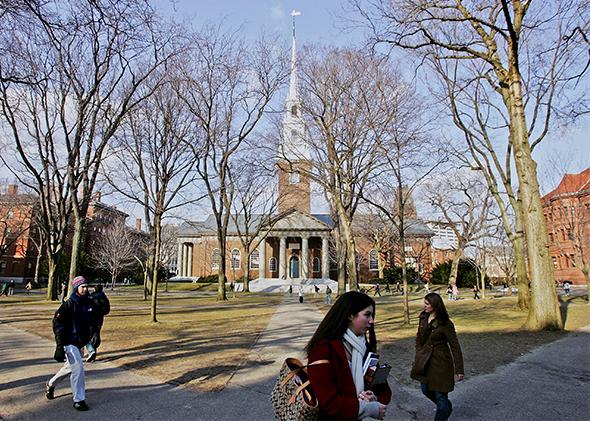The Harvard Crimson published an anonymous, first-person account of sexual assault and its aftermath on Monday. The letter, from the alleged victim, opens, “Dear Harvard: You Win.” What has Harvard won? After nine months of resisting this student’s pleas for action, validation, and empathy in the wake of what she says was sexual assault, one of the best schools in the world has won her surrender. She’ll stop requesting that her alleged assailant be moved to a different dorm. She’ll stop sending emails to “my resident dean, to my House Master, to my Sexual Assault/Sexual Harassment tutors, to counselors from the Office of Sexual Assault Prevention and Response, to my attorney.” She will dutifully swallow the pills her doctors have prescribed to combat the depression and anxiety disorders she’s developed, move away from her “blockmates and favorite tutors” to a new residence, and allow campus life to resume as normal for everyone but her.
In her words, this is what the letter writer says happened in 2013 (since the report is anonymous, we’re unable to verify it, and Harvard’s Office of Sexual Assault Prevention and Response did not return my request for comment):
He was a friend of mine and I trusted him. It was a freezing Friday night when I stumbled into his dorm room after too many drinks. He took my shirt off and started biting the skin on my neck and breast. I pushed back on his chest and asked him to stop kissing me aggressively. He laughed. He said that I should “just wear a scarf” to cover the marks. He continued to abuse my body, hurting my breast and vagina. He asked me to use my mouth. I said no. I was intoxicated, I was in pain, I was trapped between him and the wall, and I was scared to death that he would continue to ignore what I said. I stopped everything and turned my back to him, praying he would leave me alone. He started getting impatient. “Are you only going to make me hard, or are you going to make me come?” he said in a demanding tone.
It did not sound like a question. I obeyed.
But when she reported the incident to college officials, they tried to dissuade her from pressing charges. The alleged assailant, they said, may not have violated the letter of a two-decade-old sexual assault policy in the student handbook, which defines “indecent assault and battery” as anything involving “unwanted touching or fondling of a sexual nature that is accompanied by physical force or threat of bodily injury.” If the alleged victim went forward with an Administration Board case, these officials told her, he’d likely be cleared. On the other hand, the school could not take action against the accused student without a full investigative process. Moving him to a different House in the absence of an Admin Board verdict would be unjust. What they could do was pluck the letter writer out of her residential support system, as if she were to blame, and install her in a new dorm.
The student also says she received some dismally uninformed responses from the people supposedly entrusted with her welfare:
The resident dean compared living in the same House as my assailant to a divorced couple working in the same factory. My House Master and my dean encouraged me to forgive my assailant and move on. Someone at University Health Services asked me if it was possible that my drinking habits were the problem, because it seemed like they had led to my sexual assault.
These comments—even bookended by sympathetic lip service (“I would hear the same thing over and over again: ‘We want you to get all the support you need,’” the student writes)—just don’t belong in any kind of enlightened framework for addressing sexual assault. Harvard’s staff needs better training. More importantly, though, the school needs to reexamine its narrow and outdated assault definition—and thanks to student advocacy, that language is currently under review. Good. As Policy Mic reports, Harvard remains the only Ivy League school not to have accepted a doctrine of “affirmative consent,” which means they persist in viewing yes as the default mindset, placing the burden on college women to actively deter guys who want to have sex with them, rather than on men to obtain permission. (The Department of Justice removed the necessity of “force” from the statutory definition of rape in 2012.)
Recently the question of whether “rape culture” is a useful term has come to the forefront of our conversation about sexual assault. What if focusing on murky cultural factors prevents schools from prosecuting actual assailants? What if schools spend so much time educating the (generally criminally disinclined) student body about issues like objectification and entitlement that they have nothing left over for the predacious few? I agree with the Atlantic’s James Hamblin that these objections present a false binary: Leaving a student without real options after she feels she’s been assaulted is a part of rape culture, just as blaming her drinking is rape culture and reflexively doubting her story is rape culture.
Rape culture is what arises when women have no recourse in the wake of assault, and it’s part of what facilitates that assault over and over and over again. (It also results in a system in which a man can’t clear his name because no thorough investigative responses to charges are possible.) To address sexual violations directly is to both correctly deal with each individual case and to fight back against destructive norms. Useful term or not, it’s not Harvard but rape culture that “won” this week. Meaning, everyone lost.
